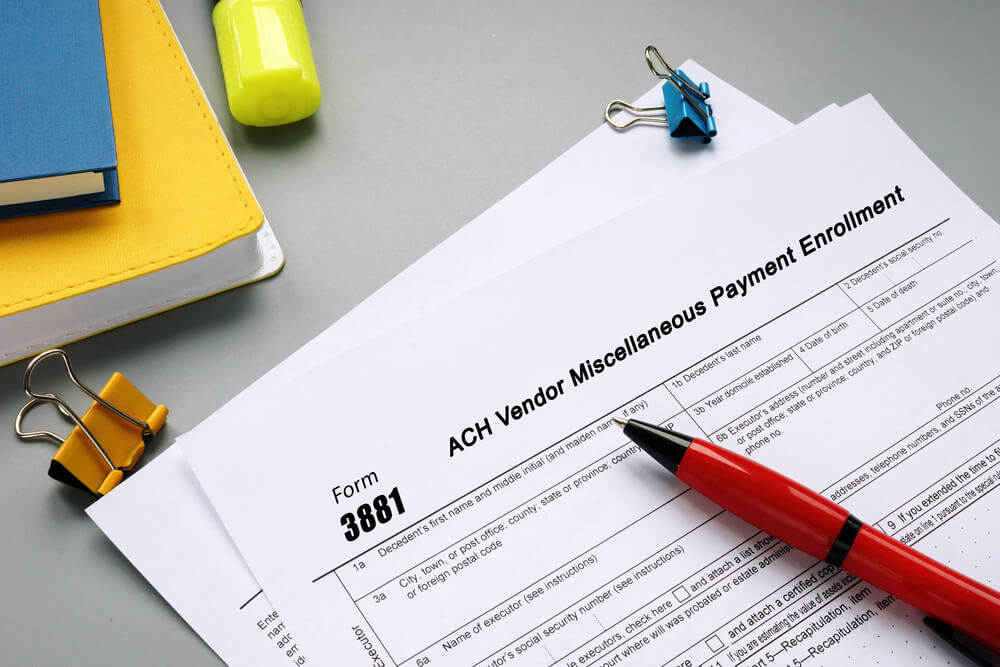A small business has many differences compared to a large one besides size. For example, any mistakes made with direct deposit payment and other financial aspects of operating a small enterprise have a greater impact. But make no mistake—small businesses are just as important as their larger counterparts. In fact, with the number of small businesses increasing in the United States, many entrepreneurs are finding an economy that nurtures their visions.
The old-fashioned methods of running a business can be just as cumbersome to a large business as a small one. Hence, small business owners must seek more efficient ways of doing things. That’s where business ACH comes in.
What Is ACH?
ACH is an abbreviation for the automated clearing house, a computer-based network that processes transactions from one bank to another. ACH is the primary system that agencies use for electronic funds transfer (EFT). It allows for online payments and electronic deposits within or between financial institutions.
The idea for ACH first came about in the 1960s from concerns over getting paychecks on time. In 1968, a group of check clearinghouses sought an automated payment system to clear checks for payroll. This group created The Special Committee on Paperless Entries (SCOPE).
In 1972, the Federal Reserve Bank of San Francisco established the first ACH in the U.S. Other regional ACH associations followed suit. Their need for compliance led to the 1974 founding of the National Automated Clearing House, the organization that regulates this network.

How Business ACH Works
ACH differs from eChecks, which are simply electronic checks and thus must follow check-settlement rules. EChecks use ACH in the last step of the process for settling funds. They can convert to ACH with proper notice from the merchant, but they are not the same. ACH also differs from wire transfers since payers can cancel the payment and the payments process in batches rather than individually.
Business ACH is mainly used to transfer direct deposits, government benefits, business bill payments, and customer payments. To sign up, a payer authorizes a biller to draw funds from their account and does so either with a paper form, online or over the phone. Although business ACH sounds like a practice for large businesses, it can be helpful in terms of convenience and cost for small ones. Here are seven ACH benefits to consider for your own small business.
7 ACH Benefits
- It Makes for Easy Billing
The option to receive ACH payments isn’t suitable for every type of payment situation. Still, it’s good to make sure you can send or receive regularly scheduled payments on time, whether they’re on-demand or recurring. Using ACH payments for bills means a business owner can either set them recurring and forget about them or make one-off payments to authorize funding only when they want to.
All payments for a specific date settle at any one of three times during that day. Replacing credit and debit card payments means cutting down on processing fees, which ACH provides a considerable advantage. You’ll also enjoy not needing to issue reminders and invoices with the option to receive ACH payments.
- It’s Very Convenient
Employees enjoy the convenience of direct deposits over paper checks. Nobody wants to have to make an effort to come into work simply to pick up their paychecks. It’s also inconvenient having to deposit or cash checks. If payday is Friday and employees are working on that day, they likely won’t deposit or cash their checks at banks until the following Monday. Direct deposit payment is easy to sign up for and establish.
- It Saves You Money
ACH payments cost less than credit and debit card payments, which incur the most expensive transaction fees. Paper checks cost the least in fees but end up costing merchants more labor and time, so it’s a drawback for small business owners sticking to a tight budget. However, saving money is an advantage ACH offers business owners trying to cut costs.
- It Saves You Time
If time is money, then saving time is also saving money. ACH payments process online and take priority over paper checks. Unlike paper checks, they process in batches instead of individual transactions. This means a batch of ACH payments processes as two transactions (outgoing and incoming) instead of several. This simple option makes it much faster to send and receive funds, even on the same day.
Likewise, employers appreciate the convenience of the direct deposit payment option. The automation makes sure employees get paid on time. In addition, direct deposit payments can occur even earlier than the issuing of paper checks, allowing recipients to have funds right away. There’s no wait for pending funds to become available because they are known as soon as they deposit into the payee’s bank account.
- It’s a Sustainable Alternative
Going green is vital for the environment, and doing away with unnecessary products is part of it. For example, it is necessary to cut down several hundreds of thousands of trees to produce paper checks. In addition to filtering out pollutant gases and particles and serving as habitats for many animal species, trees help regulate air movement, temperature, and humidity. Plus, paper checks use ink, envelopes, and stamps, and transporting them uses fuel.
A small business can end up paying several dollars per paper check; according to NACHA, it costs up to $2 for a paper check compared to 35 cents maximum for a direct deposit. The electronic transactions of ACH payments erase the need for paper and the entire paper check creation and delivery process. This makes it a valuable, sustainable option that saves money, time, labor, and other resources.

- It Offers Greater Security
ACH payments have the lowest fraud rate, according to NACHA. If an ACH error or fraud occurs, it is much easier to deal with than paper checks. This is a vast advantage that ACH offers for high-risk businesses, such as small enterprises. When there are insufficient funds, paper checks bounce and incur fees for each deposit attempt.
On the other hand, ACH payments can either simply fail or overdraw from the account right away, with no waiting to see if funds were available or not. Also, whereas paper checks expose your financial information every time you write them, you only need to do so once to initiate ACH payments from your financial institution. There’s no need to worry about payments getting lost in the mail or stolen, either, as is the case with paper checks. Finally, you can easily create trust between your small business and other businesses with the security ACH payments bring.
- It Has Fewer Human Errors
It’s frustrating to want to cash or deposit a paper check only to discover that it needs reissuing due to an error. Errors cost time and money, and ACH payments reduce the possibility of human errors. They can also be quickly and easily disputed, reversed, or canceled if necessary.
Now we’d like to know what you think. The advantage that ACH provides small business owners is excellent, and as you can see, the benefits of ACH usually far outweigh any drawbacks. Consider the possibility of improving your small business with this one simple yet impactful change. What did you enjoy most about the benefits of ACH? Please comment below or contact us to learn more.
